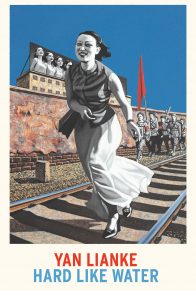“The stories describe life under a locked-down totalitarian dictatorship in which everything is controlled by the central government, including writing and reading; in which society is riddled with spies who report on the most trivial of aberrations; and in which the non-elites are starved and overworked and lied to about the real state of affairs. This book emphasizes the value of an open society in which many voices can be heard—not just one authoritarian voice.”—Margaret Atwood, Literary Hub
“[A] remarkable collection . . . [the stories’] power is in the plain-spoken, almost artless way they convey daily life under an ever-watchful, whimsically cruel regime . . . This courageous book offers an important reminder that not all dystopias are invented.”—Sam Sacks, Wall Street Journal
“Searing fiction by an anonymous dissident . . . A fierce indictment of life in the totalitarian North.”—New York Times
“They say fact is stranger than fiction. One book smuggled out of North Korea encapsulates both . . . A reflection of life under North Korean rule . . . This is the first known writer of a book, critical of North Korea, who is still inside the country.”—Paula Hancocks, CNN
“The Accusation shines a light on the dark half of the Korean peninsula with stories that are as readable as they are important . . . If these stories are an exorcism for the author, they are a revelation for us; The Accusation is fiction, but it is fiction that screams truth. Like its great literary predecessor One Day in the Life of Ivan Denisovich, The Accusation is a powerful work that seems destined to serve as the go-to example, and indictment, of life in the Democratic People’s Republic of Korea.”—National Post
“Deborah Smith . . . vividly brings to English the taut, searing stories . . . Each turn of the page, each moment of anger and sadness a reader feels for Bandi’s characters comes with a deeper ache. The reader knows, horribly, that all of these things are still happening.”—Minneapolis Star Tribune
“Seven short stories, each pointing an accusing finger at the ruling regime, shine a light on North Korea’s ‘truly fathomless darkness’ . . . In the midst of dashed hopes and broken dreams, the flame of hope barely flickers. These are indeed, as the book’s subtitle says, Forbidden Stories from Inside North Korea.”—“The Best Books on North Korea,” The Guardian
“The seven stories paint an eye-opening portrait of life under the brutal regime… The Accusation is a testament to the resilience of the North Korean people and a proof that goodness still exists even in the most hostile environments.”—Electric Literature
“Miraculous . . . Raises the question of what it means to be an artist of any kind in Bandi’s country or in any other totalitarian state . . . Bandi’s work speaks to our irrepressible need for self-expression and drive to create art. His writing and characters prove magnetic; they are anything but the one-dimensional characters of North Korean propaganda.”—Zyzzyva
“Revelatory . . . Bandi, whoever he may be, has made history. He’s illuminated the daily life of North Koreans, presenting them as human beings living in—and in spite of—extraordinary circumstances. The Accusation, which is a triumph simply for existing, places Bandi in the canon of dissenting literature. Now we can only hope to read more of his work.”—Paste
“The seven stories . . . aptly convey the hardships and constant trauma that people face in a country cut off from the rest of the world . . . Written with deep emotion and elegance.”—Business Standard
“All we can do is to read these ‘accusations.’ Only that will save the writer who wrote and sent them out into the world at the risk of his own life.”—Kyung-Sook Shin, New York Times bestselling author of Please Look After Mom
“The Accusation is a stark and often despair-inducing collection, but one we should read with great urgency at this moment, both as a document of what is and what could be and as a way to continue gaining better understanding of the complexities of North Korean society, which remains elusive to the West . . . The Accusation represents a milestone for those living outside the DPRK, but also in a sense for those living within its borders . . . Bandi refuses simplicity for his characters. Instead he gifts them forceful and vivid voices.”—Words Without Borders
“A startling collection of short stories revealing the brutal reality of life inside the isolated regime . . . A remarkable feat of dissident literature . . . The seven short stories and one poem presented in The Accusation are based on harrowing true events, which only heightens their import and impact . . . A clarion call for justice, The Accusation is an unforgettable testament to indomitable human spirit, written with an unbending commitment to the truth, at times difficult to bear, but also spiked with a sharp satirical spear . . . Immeasurably vital.”—New Daily
“This is an extraordinary tale of ordinary people in North Korea . . . A highly readable, nuanced, credible picture of a country where ordinary people go about their lives treading around the regime, and sometimes bumping into it.”—BBC World Service
“A collection of courageous and confounding short stories . . . expertly translated by Deborah Smith . . . Shows similarities of both quality and content to stories by authors as various as Gorky, Solzhenitsyn and Chen Ruoxi, or even Chinese contemporaries such as Yan Lianke . . . Vivid and uncompromising storytelling.”—New Statesman (UK)
“These short works offer powerful insights into a world behind walls . . . In its scope and courage, The Accusation is an act of great love.”—Guardian
“Unflinching tales from North Korea . . . Enlightening . . . A compelling collection.”—Observer (UK)
“Billed as the first work of fiction by someone still living in North Korea (under a pen-name meaning ‘firefly’), Bandi’s collection set during the Arduous March of the early 1990s is understated, detail-rich, full of pathos and incredibly brave.”—The Globe and Mail
“The Accusation takes us across a deep cultural and political border . . . The stories, written between 1989 and 1995, constitute a passionate J’accuse . . . Shines a necessary light on what remains one of the darkest places on Earth.”—Hamilton Spectator
“A rare piece of fiction from one of the world’s most repressive regimes . . . A dramatic page-turner.”—Quartz
“For readers interested in a candid look at life in North Korea, The Accusation . . . will immerse you via the stories of common folk.”—Millions
“A concise and clearly written and translated work . . . The stories document the poverty, mutual spying and damaged family relations, the desire for openness and dream of defection that imbue everyday life.”—The Hudson Review
“Bandi has been likened to Aleksandr Solzhenitsyn. This is a specious analogy . . . Bandi cannot be fitted into familiar traditions because he is unprecedented. North Korea is unlike anything that exists or has existed . . . Bandi’s existence proves that fear and mass hypnosis haven’t yet succeeded in annihilating the imaginations of North Koreans. If the stories in The Accusation are sourced from the actual experiences of actual people, then there can be no doubt that there are multiple Bandis in the country—men and women like the characters in The Accusation who are striving to preserve their souls from the assaults of the Kim dynasty.”—The National
“The Accusation continues to make international history as the first literary work smuggled out of repressive North Korea . . . Illuminating stories that reveal desperate lives enduring terrifying day-to-day challenges . . . British translator Smith . . . expertly delivers Bandi’s subversive prose with nuanced grace . . . As Bandi’s characters both fear and sling accusations, the title takes on piercing gravitas for readers.”—Booklist (starred review)
“With these uncompromising stories, the pseudonymous Bandi gives a rare glimpse of life in the “truly fathomless darkness” of North Korea . . . An endnote about how Bandi’s collection was smuggled out of the country reveals just how miraculous it is that it exists at all.”—Publishers Weekly
“Fugitive fiction—literally—from inside North Korea, devastatingly critical of the Kim dynasty and its workers’ paradise . . . There is a streak of satire in these stories, but mostly they are grimly realistic . . . Certainly the author has access to the broad sweep of North Korean society, from industrial workers and farmers to midlevel political functionaries . . . An important document of witness.”—Kirkus Reviews
“No fiction beyond a trickle of agitprop has passed beyond North Korea’s borders, and of course dissident voices are suppressed altogether. When it was smuggled out, this story collection became an international publishing sensation.”—Library Journal
“Well-crafted stories . . . The Accusation is a haunting, disturbing collection . . . worthwhile.”—Complete Review
“[An] insightful and harrowing collection of stories written about life in North Korea . . . The overarching aspects of everyday life in a terrorist regime are on full display . . . [Bandi’s] stories are delivered in a simple style, but neither time nor translation lessen their impact.”—US Review of Books
“[A] slim, powerful volume.”—Week
“Bandi’s writing style is markedly different from that of Western fiction . . . The rather bare-bones, bracing style fits the stories told. Their content has so much implicit drama and heartache, there’s no need to elaborate . . . The Accusation is a quick read . . . Worthy of attention.”—Crime Fiction Lover
“The stories are understated but the dissent is scorching. The only way to adequately honour writing that puts the author’s life in danger is to read it.”—Globe and Mail
“Dissident tales from pseudonymous author Bandi, still living in the country . . . very rare fiction to emerge from the secretive dictatorship . . . on its way to becoming an international literary sensation.”—Alison Flood, Guardian
“[A] remarkable collection of stories . . . Revealing the terrible truth of living in a country where any any freedoms are curtailed, where famine and brutality are rife, but where human belief and hope can survive any odds, this is a defining read for 2017.”—Emerald Street (UK)
“Compelling, at times heartbreaking . . . [There] are echoes of great dissident writers such as Alexander Solzhenitsyn and leading Western chroniclers of 20th-century totalitarianism such as George Orwell . . . There is a rawness about the prose that is as startling as it is unsettling . . . In common with Fyodor Dostoevsky, Bandi has the deepest sympathy for the unassuageable anguish of his or her characters . . . [A] truly remarkable book . . . [The Accusation] may well be the most important work of fiction published this year.”—Australian
“The Accusation courageously speaks for millions of people who collectively long for a life of peace.”—Culture Trip
“Plunges us into the daily life of families in North Korea. These stories are the cry of a man suffocated by totalitarianism. These are also the cry of an entire people who have been broken under the yoke of North Korean communism . . . The author makes use of storytelling, poetry, humor, and even the burlesque to aid his condemnation of these unbearable injustices. The writing is simple, humble, which gives it its beauty. The seven novellas shine with humanity and tenderness.”—Aleteia
“This collection of novellas that the author managed to extract from his country is of incredible value . . . The classic construction reminds us of Gogol and Chekhov, and for their taste for absurdist satire, Ionesco and Bulgakov.”—Books Magazine
“Describes in very impressionistic, subtle, almost veiled tones, if I may, the daily life of a dictatorship . . . The book gives a human face, gives stories and images, to the sufferings of North Koreans . . . I was almost groggy by the time I finished reading, reminding myself of just how lucky I am to live in a democracy . . . I thought of Orwell and Kafka but realized that the country described here really exists and that there are people who are living there, perhaps not even knowing that a different kind of life is possible.”—L’express
“Bandi, a pseudonym that means “firefly”, has achieved the unthinkable – offering a testimony on the dictatorial regime of North Korea while remaining in situ . . . In the same way as the works of Solzhenitsyn in their time, Bandi’s writing reminds us of the perennial necessity of battling censorship, whatever the cost.”—L’amour des livres
“This author is completely unknown and would like to stay that way. He continues to live in a country that is held fast by an iron fist, putting his life at risk by writing. He describes, not without humor, the ordinary life of this dictatorship, the extreme misery there, and the surveillance networks that have been put in place by the regime, which make everyone into a potential spy or informant.”—Mag Dimanche
“Even if one did not know anything about the writer or the way the manuscript was smuggled out of the country, it would not diminish the fact that the force of this collection of novellas evokes the classics of world literature about totalitarianism.”—L’ours
“A message in a bottle that is so precious that we should all reach out to grab it and better understand the tragedy of the last Marxist regime in the world.”—Le Revenu
“Stories of simple people that are humiliated and beaten down for absurd reasons, watched over by grotesque henchmen and toadying neighbors, arrested and punished by a dictatorship that has held the country under its heel for six decades. A book to burst the silence.”—La Vie
“This rare collection offers seven moving novellas, snapshots of a country where nothing normal ever leaks out . . . A far cry from the grandiloquent, ridiculous images that are thrown out by the Kim Jong-Un regime, The Accusation offers the opportunity to discover a moving portrait of a secret country, a forgotten land where humanity only asks to try to triumph.”—Lire
“No one could imagine that it could be at all comical to live in a dictatorship, but in describing the limitless absurdity of the system, Bandi sometimes makes the reader give out a nervous laugh . . . A fragile hint of light in a country that confuses democracy with obscurantism.”—L’Alsace
“Each of these stories shows a different aspect of the remorseless dictatorship . . . With a fierce sense of irony and a deeply dark humor, Bandi denounces totalitarianism, the divisions in North Korean society, and the absurdity and corruption of the one party system.”—La Grande Parade
“Stories written with a great humanity, the work of a true writer.”—Lecturama.fr
“The appearance of this collection of seven novellas is a true publishing event.”—Livres Hebdo
“This is a work of unassailable tragedy. There are points you can’t bring yourself to read anymore, it’s a full blown, collision course that cannot be avoided. You want to scream out—how can life be this cruel? But you don’t, for as you learn in The Accusation, that will do no good . . . Bandi has looked into the soul of the Workers’ Party, its machinations, and discovered its dark, demonic heart.”—Arsalan Isa, The News on Sunday (Pakistan)
“Heart-wrenching . . . a powerful and unflinching portrait of life under the rule of Kim Il-sung and Kim Jong-il.” —NDTV (New Delhi)













